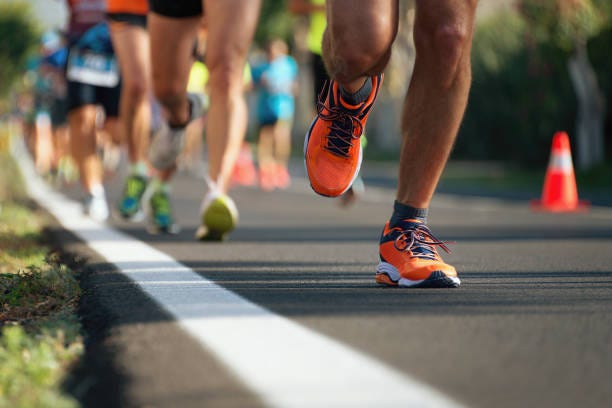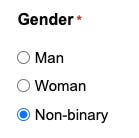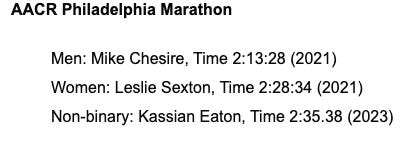They self-identified as nonbinary, they self-identified as worthy of prize money. Can they self-identify as elite?
A textbook example of activist overreach is underway at the Philadelphia Marathon
Philadelphia Gay News (PGN) reported that three runners with nonbinary identities have filed a complaint with the Philadelphia Committee on Human Relations claiming that the Philadelphia Marathon’s refusal to add a nonbinary category to their professional field is discriminatory. To be clear, the Philadelphia Marathon does offer open male, female, and nonbinary categories with substantial prize money—$4000 for first, $2000 for second, $1000 for third—across all three categories. Not good enough. The complainants, only one of who is named, want a nonbinary category in the professional race and the same $10,000 first prize, and perks like free or discounted registration, individualized water stations, and front row starting position that male and female runners in the professional field receive.
Josh Fernandez, a male runner who identifies as both nonbinary and elite, and who may or may not be one of the complainants, told PGN, “Especially at a time when LGBTQ rights are under attack across the country — especially for trans folks and especially for trans athletes, this is the opportunity for Philadelphia to send a signal that every athlete, every runner, matters.”
What eludes Fernandez is that the elite field is, by definition, exclusive. Yes, any runner can register for the Philadelphia Marathon in the open race with an equal chance to win equal prize money—everyone matters! But the elite field is different. Not every runner can be included in the elite field. It’s not that a whole lot of runners don’t matter—it’s that they’re ineligible for the professional field because they’re simply not fast enough.
You cannot identify into the elite field. This is stupifyingly self-evident to about 99% of the people on this planet, but not to a tiny population of people who have become accustomed to identifying as sexes or lack of sexes that they are not, and to claiming rights, places, and awards for which they are ineligible. And to the horror of thinking people, this outrageously entitled group has been accommodated.
Absurd, absurder, absurdest. It worked before—why not try it again? This is a textbook example of activist overreach. Can runners with nonbinary identities self-identify as elite? Will trans activists finally be told, No?
There should never have been a nonbinary category to begin with since the male and female categories are inclusive of every human being ever born, but the Philadelphia Marathon, like many other race organizations capitulated to activists’ claims that nonbinary runners felt “unsafe” and experienced existential anxiety by having to check off a male or female box. Of course, before 2021, runners with nonbinary identities (I use this awkward construction because no one is nonbinary) did this, and lived.
The Philadelphia Marathon introduced a nonbinary category, with no attached prize money, in 2022. Here are the results from the 2022 nonbinary category: there were 18 finishers, male runner WinterParts, the only complainant named by the PGN article, won that category in a decidedly non-elite time of 2:39 which would have earned him 86th place in the male category. Josh Fernandez, also male, placed fifth in the nonbinary division of that 2022 Philadelphia Marathon, in 3:27. That time would have placed him somewhere in the neighborhood of 1549th in the male category. These 18 runners got the ability to register according to their gender identity, all-gender bathrooms and changing spaces, private lactation spaces for “chestfeeding” athletes, inclusive language throughout the race website and materials, and security personnel who had gone through sensitivity training. Special language, special rights to use their own or women’s spaces—this was already more than a tiny self-declared special group could or should have expected.
But that was not enough. Activists who had said that runners with trans and nonbinary identities just wanted to participate as their true selves, that it wasn’t about prizes or competition, that races were simply fun community events, changed their tune. Within a year of the nonbinary category being introduced, activists demanded the same prize money as open males and females. Meeting with race officials, Fernandez said having the ability to win equal prize money as the top males and females would help “improve their experience.” It very much was about the money, though Fernandez seemed to misunderstand the concept of earning prize money, that $4000 was a recognition of excellence, not a participation trophy. He also had never spoken with Joanna Harper, a trans-identified male scientist who’s been extremely influential in trans inclusion policy. Harper pointed out the obvious in the nonbinary division—it’s an meaningless category made up of people of two different sexes with inherently unequal abilities that should, for competitive purposes, not exist.
“I think that having a non-binary category is a wonderful idea. I think that having prize money, and especially equal prize money for the category, is a terrible idea.” That is a 2022 quote from Joanna Harper, the oft quoted trans-identified male scientist who is still pushing the debunked testosterone reduction theory. Even Harper, who has endlessly pushed for males in female sport, recognized the absurdity, the overreach, the unfairness of monetary awards for an identity rather than athletic performance. Harper continued: “competition for money should occur between people who are like enough that everyone in the category can enjoy meaningful competition. For instance, not everyone in an age group is exactly equal, however, the difference between the oldest and youngest runner in the age group is not so great that the older runner can overcome the disadvantage much (but not 50%) of the time. The differences in running speed between a non-binary runner assigned male at birth and not suppressing testosterone, and a non-binary runner assigned female at birth are great enough that we would put these runners into two different categories were it not for their gender identity. Hence, if we value meaningful competition, these two runners shouldn't compete against each other for money. Moreover, we shouldn't offer equal prize money for a very small and a very large group of people.”
But activists complained, they said they deserved to be treated as winners in their made-up category, though the first nonbinary runner (inevitably male) was many minutes behind the first male and often behind the first female. Instead of being recognized for outstanding athletic achievement as the first male and female were, the first nonbinary runner, finishing well back in the pack, was simply being recognized for having a special identity. For example, male runner Galo Vasquez who identifies as nonbinary set the nonbinary half marathon record of 1:10 in 2023, but that was ten minutes behind the male winner that year who clocked 1:00 and a few seconds. Making nonbinary prize money even less deserved, Vasquez was competing for the win against 25 people instead of the thousands the male and female winner had to beat for the win.
Nonetheless, race organizers capitulated again, and as of 2024, male runners (or in rare instances, a female using testosterone ) with nonbinary identities were awarded the same prize money as males and females in the open division. Male runner with a nonbinary identity Reed Williams won the 2024 nonbinary division in 2:46, receiving $4000. William Loevner won the men’s open division in 2:16, fully 30 minutes faster than Williams, for the same $4000. In fact, the female winner finished in 2:36, ten minutes faster than the “nonbinary winner” for the same $4000.
But that was not enough. Now, nonbinary runners want “full inclusion” in the Philadelphia Marathon events, which also includes a half-marathon and 8K run. They want a nonbinary category added to the professional field.
I reached out to the race organizers, to Josh Fernandez, and to USA Track & Field but have not received response.
Josh Fernandez and Winter Parts, two male runners with nonbinary identities who were quoted in the PGN article and are advocating for a nonbinary division in the elite field demonstrated basic misunderstanding of the professional field and even what elite means by their comments.
PGN wrote in the first paragraph: “The race’s fastest nonbinary runners were left with a difficult choice: register in the men’s or women’s elite divisions, or compete in the open category despite qualifying for elite competition.”
That’s incorrect. No one can simply register for the elite field. Runners must apply for and be accepted to the professional field. This professional field is a way of recognizing exceptional talent, time, and effort as something beyond the amateur runners who win the open race, so the standards are necessarily high. Very few can achieve them. Only those accepted into the professional field are eligible for the significant elite prize purse. Some race organizations will post time standards that qualify as elite on their website, e.g. any male who has run a sub-2:20 marathon and any woman who has run sub-2:30 may apply for the elite field. Of course, the runner must provide documentation of these performances; one can’t simply identify as elite. From there, admission to the elite field is at the discretion of the race director and may be affected by factors such as how many applicants there are, desired field size, distribution of local, national, and international runners.
Sometimes, as is the case with the Philadelphia Marathon, there are no posted standards for the professional field; inclusion is by invitation only. So no runner knows he qualifies for the Philadelphia Marathon, as the PGN article states. According to the organization’s Professional Athlete page, any runner who thinks they are elite can fill out the form which includes a link to verify their qualifying time, and confusingly, a mandatory Gender field that includes Man, Woman, and Nonbinary
My guess is that this field was mistakenly brought over from the open registration form. The page that spells out the prizes is clear that the professional field awards only male and female prizes.
And prize money is very much on Fernandez’s mind. Speaking of the $10,000 first prize in the elite race, he said: “That’s a pretty substantial amount of money and amenities available to you if you’re given the elite treatment. Open division is not even half that.” He went on to say he thought the Philadelphia Marathon had the money, they were simply discriminating against runners with nonbinary identities. It’s astounding how quickly activists like Fernandez have ramped up their demands for services, spaces, and money. Give them a nonbinary category, they take $10,000.
The key word in his quote is “given.” Fernandez fails to understand that elite runners earn that elite treatment, they earn admittance in the elite field, and if they’re very lucky, they earn that $10,000. Hour by hour, day by day, mile by balls-to-the-wall mile. Nothing is given to them.
On the other hand, male runners with nonbinary identities have been given an extra half-hour to qualify for the Boston Marathon, by using the women’s qualifying standard instead of the men’s. A male with a nonbinary identity who finishes in 86th place is not earning that $4000, he’s given it.
While what is considered elite is not set in stone, race organizations can rely on thousands, perhaps millions, of data points, the finish times of males and females from past years of their own race or other races. They can pretty accurately determine what constitutes elite using some algorithm like the average tenth or twentieth place time over a period of years.
The nonbinary division was only introduced in 2021, not all races even have it, the number of registrants is vanishingly small and performances in that category are decidedly not elite. So, if the Philadelphia Marathon tried to establish an elite standard for the nonbinary division, they could simply use the women’s elite standard, which would be blatantly unfair since the few runners with nonbinary identities who might meet that standard are male. Judging from the nonbinary records set since 2022, few if any nonbinary runners would meet a male elite standard. That means a nonbinary elite field would be so small almost every runner who actually qualified as even close to elite would be guaranteed significant money—from $10,000 for first, to $7,500, to $5,000, to $2,500, to $1000. That’s not earning anything; that’s being given a lot of money for having a special identity. If, on the other hand, race directors wanted to enlarge the elite nonbinary division, they’d have to lower the bar for what is considered elite. Using the only three years of nonbinary marathon results they have, years that had no more than 25 finishers total, and taking an average of the fifth place finishing time to calculate “elite,” they would have to accept somewhere around 3:21 as an elite nonbinary standard. Under no circumstance can 3:21 and elite be used in the same sentence except with the word “not.”
These are the course record holders. To say that female very likely on testosterone Kassion Eaton deserves $10,000 for running a time seven minutes slower than the women’s record, and 12 minutes slower than the men’s is a profound misunderstanding of the word elite, and of competition, or fairness.
From PGN: “Until an elite category becomes the norm, Fernandez emphasized, nonbinary runners with aspirations to compete on the national and international stage will continue to face discrimination when attempting to access competitive sporting events.”
Wrong again. Runners with nonbinary identities and high aspirations like Olympic runner Nikki Hiltz can and have accessed elite competition in the same way as every other runner on the planet—by having the talent, by putting in the work, by qualifying for the event, and running in his/her sex category. Let’s not forget that Fernandez, a man whose running resume is devoid of any risk of eliteness, claims he has been running in the nonbinary elite division of other unnamed races for five years. Which is before any races had a nonbinary category, elite or otherwise.
Winter Parts, a male runner who is one of the complainants advocating for nonbinary inclusion in the elite field, told PGN: “I think it’s really important to have a nonbinary elite division just in terms of being recognized for all the work that we are putting in as nonbinary athletes.” Parts said he trained just as hard as the elite runners who race in the men’s and women’s categories.
Who is going to tell him? Lots of people train as hard as elite runners, or think they do, but somehow haven’t managed to make it to the Olympic final. Most people understand this. Them’s the breaks. They do not expect to be “given the elite treatment” just for working hard. Parts has improved. He ran a 1:13 half-marathon in 2023 , and improved to 1:09 earlier in 2025. Both of those times are quite good, for a woman. Parts identifies as nonbinary and transfeminine, which is apparently where his confusion lies. His 1:09 performance is the only entry on his World Athletics profile page but World Athletics does not recognize nonbinary identities, so he was forced to be listed as male. And among males, a 1:09 half-marathon is not elite.
For all the reasons Joanna Harper mentioned—two vastly differently abled groups (male and female) in the same category, and extremely small numbers of runners with nonbinary identities—neither World Athletics nor USA Track & Field recognize a nonbinary category in elite races. They base eligibility for categories on biological reality. They’ve rejected competition based on someone’s self-declarations, whether that is identity or elite status. When World Athletics queried their member federations, athletes, and even human rights groups, there was little support for a nonbinary category at the elite level.
Parts told PGN, “My ideal outcome is just that we get the elite nonbinary athlete to be treated the same way as the elite men’s and women’s categories.”
The problem which Winter Parts and Josh Fernandez ably demonstrated is that runners with nonbinary identities have always demanded to be treated differently from other runners, to be treated as something they are not. More and more, courts and sports organizations are saying, Enough. You can self-identify as nonbinary. You cannot self-identify as elite.





But look at it from the non-binary activists' perspective: no race or race organizer has pushed back on this nonsense. They've all caved. Running USA, the trade organization for the road race industry, has given grants and awards to some of the OG non-binary activists. The head of New York Road Runners bragged about his role in a non-binary trans-identifying female runner get a Therapeutic Use Exemption for testosterone from USADA, which was facilitated by a white shoe law firm, Winston & Strawn, working pro bono. The running media scolds each other when they don't refer to Nikki Hiltz as they/them while she pops off about how much she disdains the female category (the category, not the Substack).
Given all that, if you were in their / they / them shoes, why *wouldn't* you push for me?
This is such horsehit. I could barely stand to read the whole thing.
Hey, Fernandez, sweetie, guess what? Nobody owes you anything. You're not elite. You're just a greedy, gaslighting, manipulative little shit. You want money. And you think society owes it to you. Surprise! It doesn't.
Gee, I "identify" as a prima ballerina! Therefore, ABT or NYCB should put me on stage! After all, I'm elite because I say so!